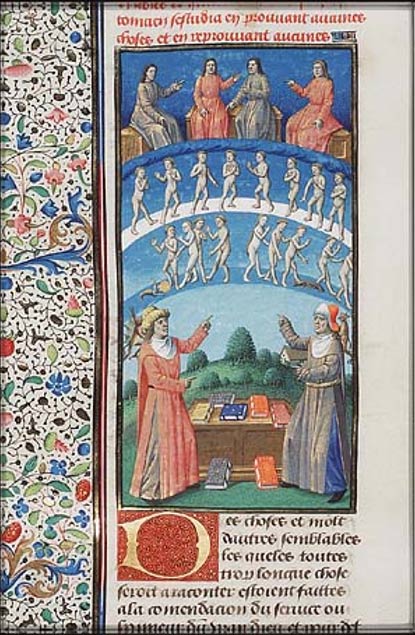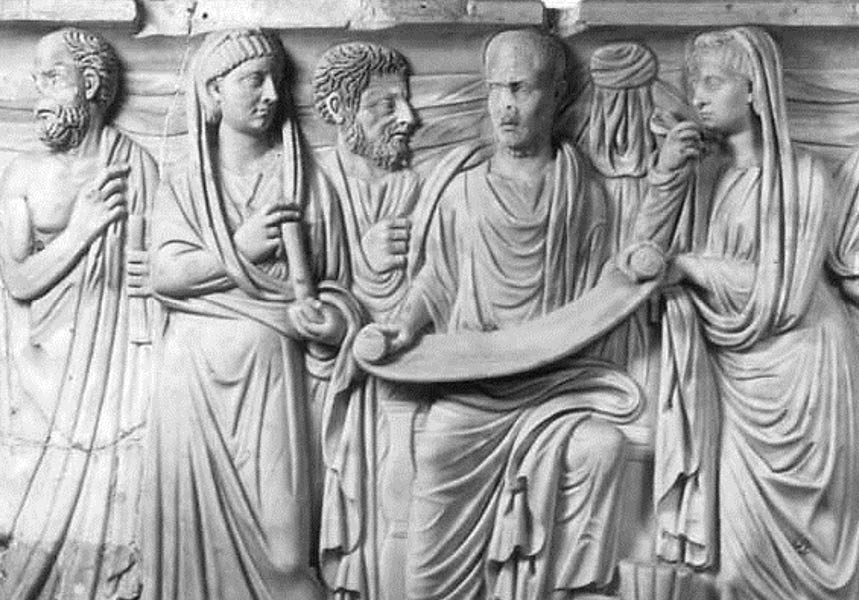Plotinus: Platonism with a Twist for Christian, Muslim, and Jewish Thinkers
Plotinus was an ancient Greek-speaking philosopher who lived during the 3rd century AD. He is generally considered to be the founder of Neoplatonism, though Plotinus may have actually considered himself a Platonist with a twist.
Although Plotinus drew upon the teachings of Plato, he also offered some new insights into that knowledge as well. Plotinus’ contribution to the Platonic philosophical tradition is his development of a spiritual cosmology that involved three elements – the One, the Intelligence, and the Soul. The impact of Plotinus’ philosophy is evident in the writings of Christian, Muslim, and Jewish thinkers, who were inspired by Platonism for centuries, and whose knowledge of Plato was derived from Plotinus.

Marble head. Ostia Antica, Museo, inv. 68. Marble head broken through neck. Lower half of nose and rim of left ear damaged. One of four replicas which were all discovered in Ostia. The identification as Plotinus is plausible but not proven. (Public Domain)
Who was Plotinus?
Compared to other ancient philosophers, we know much about the life of Plotinus. This is thanks to one of his students, Porphyry, who provided a biography of his teacher in the preface to his edition of Plotinus’ Enneads. According to Porphyry, Plotinus was born in 204 AD in Egypt. Whilst Porphyry does not mention his teacher’s exact place of birth, a 4th century writer, Eunapius, wrote that Plotinus was born in Lycopolis, which is either a town located on the Nile Delta, or the modern city of Asyut in Upper Egypt.
- Did He Create a Blissful Utopia or a Tyrannical Communist Nightmare? Plato’s Ancient Class System and Social Engineering Revealed
- “God’s Number”: The Origins of One
- What Treasures Were Lost in the Destruction of the Great Musaeum of Alexandria?

Philosophers Porphyry and Plotinus Dispute Astrology (medieval illuminated manuscript). (Public Domain)
At the age of 27, Plotinus took an interest in philosophy, and went to Alexandria in search of a teacher. He attended the lectures of the most highly reputed philosophers in the city, though he found none of them satisfying. Plotinus shared his dilemma with a friend, who suggested that he should attend a lecture by Ammonius Saccas. Having heard Saccas speak, Plotinus decided to follow him, and became his student for the next ten or eleven years.
During this period of instruction, Plotinus seems to have developed an interest in Persian and Indian philosophy and was eager to learn more about them. An opportunity presented itself to Plotinus in the form of a military campaign that was to be undertaken by the Roman emperor Gordian III against the Sassanian Empire. Thus, Plotinus attached himself to the Roman army, and set out for the East with them.
Unfortunately, the emperor died during the expedition, either at the hands of an assassin in Mesopotamia, or during a battle against the Sassanians. As a result, the campaign was aborted, and Plotinus returned to the Roman Empire, first to Antioch, and thence to Rome.
Settling in Rome
Plotinus settled in Rome and lived there for 19 years before meeting Porphyry. By that time, Plotinus had established himself as a well-respected member of Roman society. For instance, the emperor Gallienus and his wife, Salonina, are recorded to have “greatly honoured and venerated Plotinus”, and many of the philosopher’s friends chose him to be the guardian of their children when they felt they were approaching death. Plotinus himself is reported to have died in 270 AD.

A Medieval representation of Plotinus. (Public Domain)
Expanding on Plato’s Ideas
Although Plotinus’ philosophy was based on the teachings of Plato, he had the opportunity to expand on them, even if this had not been his original plan. The gap of about 600 years between Plato and Plotinus had been filled with much philosophical writing that centered on Platonism. Therefore, Plotinus’ originality of thought was expressed either in his own exposition of Plato’s philosophy, or in his defense of Platonism from its critics. As a teacher, Plotinus had much opportunity to do these two.
- Plato’s Symposium: Is it Just a Joke?
- Swans Fat, Crocodile Dung, and Ashes of Snails: Achieving Beauty in Ancient Rome
- The Legend of Atlantis: Between Ancient Ruins and a Philosopher’s Tale
According to Porphyry, during Plotinus’ first ten years in Rome, he did not write anything. It was only after this that the philosopher began writing. By the time he met Porphyry, a total of 21 treatises had been written.
Another 54 treatises were written during the last 7/8 years of Plotinus’ life, and together, these form his Enneads, which were edited by Porphyry. Thanks to Porphyry, the philosophy of Plotinus was preserved, and went on to have an impact on the development of Western philosophy, especially so in the writings of Christian, Muslim, and Jewish thinkers in the centuries following his death.

Porphyrios, detail of the Tree of Jesse, the left one in the row of Greek philosophers, Sucevita Monastery, 1535. (Ymblanter/CC BY SA 4.0)
Top Image: Philosopher Plotinus with his disciples. Source: Public Domain
By Ḏḥwty
References
Armstrong, A. H., 2017. Plotinus. [Online]
Available at: https://www.britannica.com/biography/Plotinus
Gerson, L., 2012. Plotinus. [Online]
Available at: https://plato.stanford.edu/entries/plotinus/
Moore, E., 2018. Plotinus (204—270 C.E.). [Online]
Available at: https://www.iep.utm.edu/plotinus/
New World Encyclopedia, 2015. Plotinus. [Online]
Available at: http://www.newworldencyclopedia.org/entry/Plotinus
Plotinus, The Six Enneads [Online]
[MacKenna, S., Page, B.S. (trans.), 1917-1930. Plotinus’ The Six Enneads.]
Available at: http://www.sacred-texts.com/cla/plotenn/index.htm
www.philosophybasics.com, 2018. Plotinus. [Online]
Available at: https://www.philosophybasics.com/philosophers_plotinus.html



















